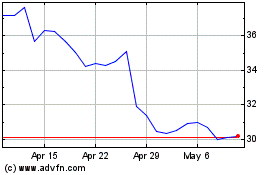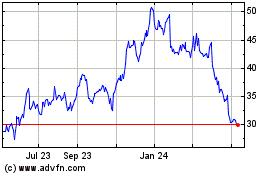Intel Overhauls Chips in Bid to Revive PC Sales
September 01 2015 - 9:29PM
Dow Jones News
By Don Clark
Intel Corp. is overhauling its flagship line of computer chips,
in a high-stakes bid to revive personal-computer sales.
The Silicon Valley giant says the sixth generation of its Core
processor family, based on a design dubbed Skylake, will boost
performance and reduce power consumption of PCs ranging from
ultrathin notebooks to high-end gaming rigs. Other Skylake features
could reduce the number of wires computer users need and replace
passwords with facial-recognition technology.
Intel's long-awaited chips, announced Tuesday night, follow the
launch of Microsoft Corp.'s new Windows 10 operating system in late
July. The two companies hope the availability of new hardware and
software will drive demand for PCs in a shrinking market.
"How Skylake does will determine the glide path of the PC
industry," said Patrick Moorhead, an analyst at Moor Insights &
Strategy.
PC sales began slowing several years ago as consumers shifted
spending to tablets and smartphones. Sales rebounded briefly in
2014, reflecting purchases by businesses as Microsoft phased out
support for its aging Windows XP software.
But conditions softened again in 2015. Unit shipments fell
nearly 12% in the second quarter, compared with a year earlier,
International Data Corp. estimates. Some analysts link the latest
decline partly to customers waiting for Windows 10 and Skylake.
Intel plans to use the Skylake design in 48 chips arriving in
coming months. Makers of high-end gaming PCs have begun offering
Skylake-based systems. Laptop makers are expected to first show off
their upgraded products at the IFA trade show in Berlin, which
opens Friday.
"It's an architecture that we are going to be seeing across the
entire PC ecosystem," said Charles King, an analyst at the research
firm Pund-IT.
Kirk Skaugen, the senior vice president who heads Intel's
client-computing group, says Intel is eyeing more than 500 million
PCs in use that are at least four years old. Compared with those
systems, Intel says, machines powered by Skylake chips will be more
than twice as fast on standard computing tasks and offer triple the
battery life. The computers also will be smaller and lighter,
because Skylake chips use less power, meaning components can be
placed closer together and will require less cooling. Compared with
the most recent systems, Intel says mainstream laptops with Skylake
chips are 10% faster on standard productivity applications at 20%
lower power consumption.
"Our research says people still want to refresh their
notebooks," Mr. Skaugen said. "They are just waiting for the right
time."
Besides computers with familiar designs, Mr. Skaugen predicts
Skylake will help popularize newer ones--including ultrathin
notebook PCs that require no cooling fans and "compute sticks,"
cartridge-style devices that plug into TVs to provide them
computing power.
Intel is encouraging PC makers to combine the new chips with
three-dimensional camera technology it developed known as
RealSense, designed to calculate the size of objects and distances
between them. Such cameras can help recognize faces for
authentication purposes or scan objects for 3-D printing, Intel
says.
The Skylake rollout also dovetails with Intel's desire to reduce
the tangle of wires on users' desktops. One key development is a
new version of the widely used Universal Serial Bus, or USB,
connection scheme that Intel is combining with technology it calls
Thunderbolt. The result allows one wire to deliver high-speed data,
drive external displays and charge laptops without a bulky power
supply, Mr. Moorhead said.
Write to Don Clark at don.clark@wsj.com
Subscribe to WSJ: http://online.wsj.com?mod=djnwires
(END) Dow Jones Newswires
September 01, 2015 21:14 ET (01:14 GMT)
Copyright (c) 2015 Dow Jones & Company, Inc.
Intel (NASDAQ:INTC)
Historical Stock Chart
From Mar 2024 to Apr 2024

Intel (NASDAQ:INTC)
Historical Stock Chart
From Apr 2023 to Apr 2024
